Long-term survivors of stroke in Australia have "fallen into a black hole," left with lifelong disability with "inadequate" ongoing services and support, according to the authors of a Perspective published today by the Medical Journal of Australia.
"People living with ongoing disability after stroke may not have the opportunity to achieve their preferred life goals. It is time to focus on the individual burden of disease and how we can best support people with stroke in the long term," wrote Dr. Kate Scrivener from Macquarie University and colleagues.
"Stroke is a chronic, lifelong health condition, but it is managed like an acute condition in Australia. Typically, a person after stroke is admitted to an acute hospital for early management; they then receive inpatient rehabilitation if they meet the selection criteria, followed by outpatient rehabilitation.
"In reality, the amount of rehabilitation provided by the hospital sector is limited," Scrivener and colleagues wrote.
"Recent moves towards early discharge and rehabilitation in the home have been shown to be less effective in maximizing function than inpatient rehabilitation, whereas functional gain is possible with investment in subacute and community rehabilitation (e.g., Council of Australian Governments national partnership agreements).
"After hospitalization, 64% of people after stroke are referred for community rehabilitation; however, the actual amount of community rehabilitation that occurs is profoundly low."
Part of the problem, according to the authors is that people after stroke are caught between the health, disability and aged care sectors.
"People after stroke report feeling forgotten and neglected once their allotted rehabilitation quota has finished," they wrote.
Unlike other chronic conditions, such as heart disease, stroke survivors are rarely the beneficiaries of interventions that can prevent further strokes.
"It is time for people with long term disability after stroke to have access to the services they need, when they require them," wrote Scrivener and colleagues.
"We suggest a new model of long-term support for people after stroke who experience ongoing disability. The cornerstone of the model is a deliberate move to the disability sector from the health sector.
"The current system is disjointed with multiple funding sources, leading to inequality in who receives which services and when. People after stroke need the ability to have regular ongoing check-ups with services implemented where required, more support for ongoing lifestyle changes such as text reminders, person-centered tools such as self-management, habit-forming exercise, ongoing gym memberships, and strategies for meaningful social interactions.
"We support the urgency for a national rehabilitation strategy to move the rehabilitation focus from the hospital to the community," they concluded.
- Karlston
-

 1
1



Recommended Comments
There are no comments to display.
Join the conversation
You can post now and register later. If you have an account, sign in now to post with your account.
Note: Your post will require moderator approval before it will be visible.